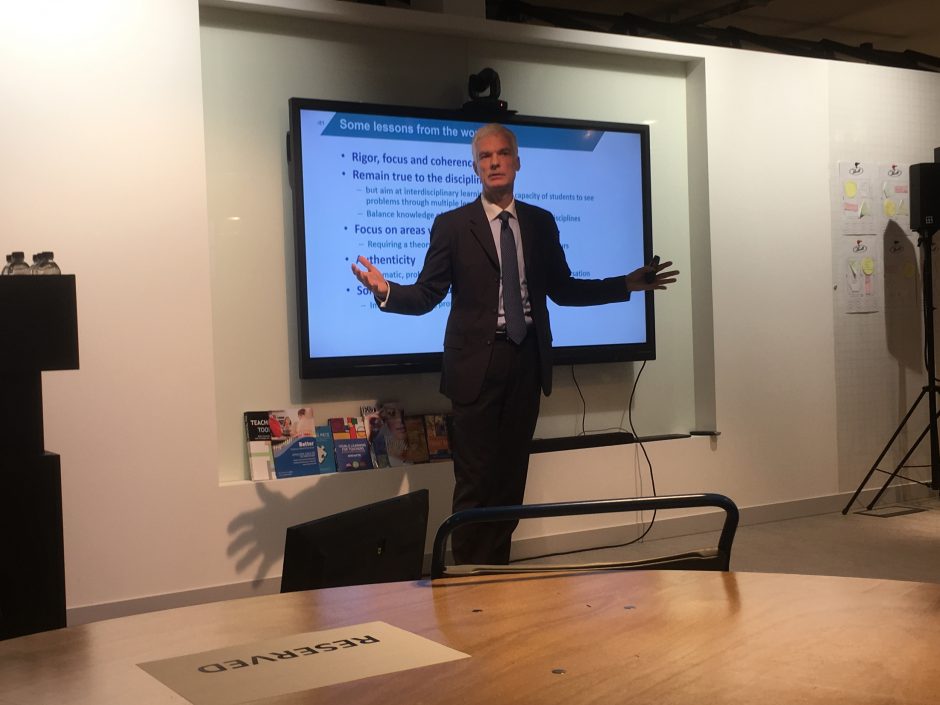This morning I am reflecting on a years journey, as a member of Canon Teaching School Alliance’s – ‘Working with Complexity in School Leadership’. An investment of six Saturday mornings, over 12+ months, with six participants, spanning a summer break, which I think was well worth the effort.
Each session included a session speaker from the University of Hertfordshire, followed by each individual member sharing their focused insights on a “knotty problem,” or “thorny issue” we encountered in our professional lives. The approached focused on written narratives and a form of hot seating that encouraged each participant to unpacked, face, explore our knotty problems, and with the support of the group, explore our own written perception of it. (Wheels within wheels.)
Complexity and the absence of a certificate
Three standout points need to be made about the course. The framework for the programme was immature, experimental, exploring experiential learning in an education leadership setting. It was made clear to us that we were “guinea pigs.” The knowledge contributors, sessions leaders, were experts in their field. The experience was forged in personal relationships.
In Keven’s reflections, he emphasised their intention to convey a “no solution” bias. Though relevant, given the umbrella of Complexity Theory, I felt that members of the group simply accepted this position statement with minimal concern.
My personal conclusions marry Keven’s summary. ‘Paying (close) attention to’ my personal interactions, and those between others key stakeholders in the organisation, has played an important role in my leadership development. This heighted awareness may well serve me well, particularly when initiating new interactions, however broadening my awareness of the complexity of organisations, can also be quite exhausting. There is now, a conscious realisation that our actions and interactions have an infinite number of consequences; that our behaviours, interactions and actions are being overseen and assessed, constantly, can be destabilising, as well as empowering.
One of the privileges of participation was to be a part of a group of colleagues from different layers of school leadership. This is atypical of leadership courses I have experienced to date in my career. That was refreshing, to be part of a group where I am not expected to lead. Refreshing, often reminding me that decisions I made as Head Teacher, are felt by others. Uncertainties within the group were quick to dissipate, conversely bonds strengthened. Chris described our group as “mature.”
What distinguishes a mature experiential group is that a larger proportion of its members is capable of identifying and addressing themes of importance to the group and of giving expression to them.
I also reflect, that as a group, we seemed to enjoy the social process of unravelling other peoples’ knotty problems. We seemed to revel in the intricacies of the social “game” of school leadership, particularly that of others. Revealing the game and the language of leadership
Groups thrive on the improvisational, and sometimes unpredictable responsiveness of human bodies caught up in the flow of continuous communication with each other. They can be exciting and stimulating places to be, but are also potentially unsettling: perhaps precisely because they are sites of the novel and spontaneous, with the potential for both sustaining and changing our identities.
It was as a consequence of this process (hearing how other leaders experienced their work space, their knotty problem) that I was encouraged to reconsider and consider my interactions as a Head Teacher. To consider not just what I did, or how I did it, but the influences, ripples these interactions may have. The broadening on one viewpoint, can be exhausting. Widescreen HD leadership.
I was also taken by Patricia Shaw’s statement,
Leadership – the art of convening conversations that might not happen otherwise. – Patricia Shaw
There are conversations I have convened, as a result of that Saturday morning session and that video clip. That is, perhaps my most important takeaway.
Lastly, noted on more than one occasion, was the inherent danger presented by organisational equilibrium. It made me think of Alex Ferguson’s leadership of Manchester United. Stability is a stagnant place. Unpredictability, is where it is at, to some extent at least, That itself is atypical. Most schools seek, strive for stability, or at least I thought they should.
Highlights
There were some very comedic moments. We laughed together, with each other, at the ludicracies (pretty sure this is not even a neologism) of our profession. (Coloured lanyards for SLT, the need for certification, the games we teachers / organisations play.)
Anticipating the next episode in participants narrative. We were, metaphorically, riding pillion on five colleagues friends careers. We became invested. We generally cared for one another and one another’s well being. I perceived we did.
Learning, the delivered sessions were pretty mind bending. Think Neo.
You take the blue pill, the story ends. You wake up in your bed and believe whatever you want to believe. You take the red pill, you stay in Wonderland, and I show you how deep the rabbit hole goes. The Matrix.
Being trusted.
Writing encouraged reflection. (I apologise for my final contribution, it didn’t measure up. I had not prioritised the time to reflect).
The benefit for my personal professional development and reflection was that members came from different roles and layers of school leadership (a Head Teacher, a Deputy, two Assistants, an Associate and a SENCO). This would prove more important than I had anticipated as the group matured.


